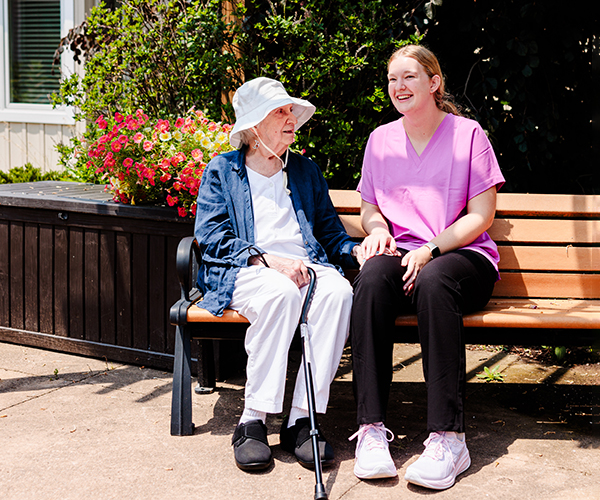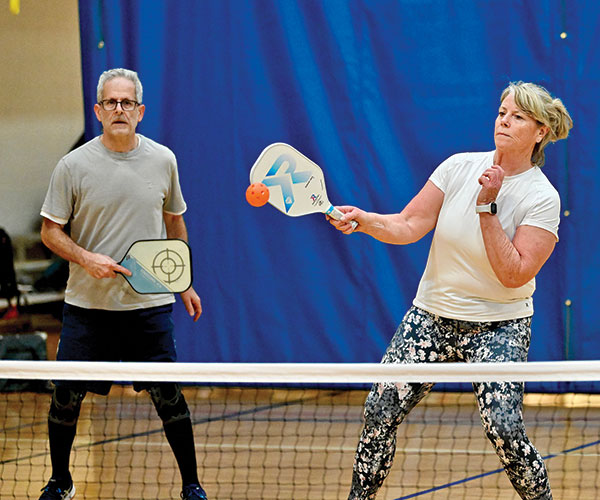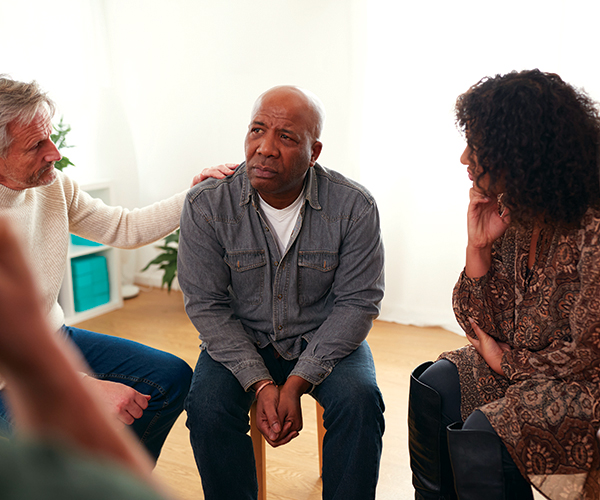Justine Myers happily traded dorm life for senior living. Rather than rooming with other 20-somethings at the Cleveland Institute of Music where she earned a master’s degree, the 25-year-old oboe player lives rent-free at Judson Manor in University Circle as an artist-in-residence.
For Myers, who is in the process of completing an artist diploma at Oberlin College, filling Judson’s hallways with the sounds of her oboe has been a high note since she moved in two years ago.
“This has been so meaningful,” she says. The residents of the senior living facility have become a surrogate family, who enjoy sharing their life experiences and always have a friendly hello.
Her appreciative audience is as overjoyed as she is — both with the music and friendship.
“It keeps this place normal,” laughs Laura Berick, 81, who lives at Judson Manor with her white poodle, Charlie, who is a beloved character in the building.
Berick and Myers have become close. They talk cooking and books by Philip Roth, and Myers takes Charlie for walks every day.
“I really think if I got into trouble I could just pick up the phone and say, ‘Justine, I need you,’ and she’d be right there,” Berick says. “Just as I would be for her.”
For Myers, who grew up in Alaska, her Judson family is a big part of what makes Cleveland home. “I feel part of the community here,” she says.
The artist-in-residence program with Cleveland Institute of Music is just one example of Judson’s focus on bringing different generations together. It also has a mentorship partnership with Breakthrough Schools’ Intergenerational School.
“We believe in lifelong learning,” says Lin Bartel, director of resident life, programming and transportation at Judson. “We also believe in comfort. It’s very comforting to know you can keep learning intergenerationally. Sharing wisdom matters.”
Located in Cleveland’s Woodland Hills neighborhood, the Intergenerational School brings in 40 senior citizens each week. About five daily volunteers serve as mentors by reading to students or helping with that tough math problem.
That kind of intergenerational engagement gives older adults a sense of purpose. In addition, the continued learning seniors experience is a generative exercise that rewires the brain by building new connections, according to A Model of Intergenerativity, a report by the school’s founders and Daniel George, an associate professor at Pennsylvania State University.
The 2011 report also showed that having older adults in the school’s hallways produced a calm atmosphere and led to more respectful behavior from students, who experience a greater level of caring and influence from older adults taking an interest in their school experiences.
Silvia Kruger, principal at the Intergenerational School, says the senior mentors are the heart and soul of the school.
“They just love on our kids,” she says. “Our mentors can stop the clock and take that time to really listen to students.”
Lifelong Learning Does a Brain Good
The Intergenerational School is structured around the philosophy that people of all ages can learn alongside each other, and the benefits of intergenerational programming are marked by the school’s research. The report evaluated how volunteer programs like the one at the Intergenerational School can enhance the quality of life of people with mild to moderate dementia.
The school collaborated with Judson Park to create an intervention group who mentored students, and a control group who participated in adult programming at Judson instead.
The intervention group reported feeling like proxy grandparents, enjoying a beneficial reciprocal relationship with youth. Participants expressed an improved quality of life, perceived health benefits (reduced depression, less stress), an elevated sense of purpose and engagement by building new relationships. The control group showed either slight decline in these areas or little change at all.
Indeed, learning is a powerful event for the brain. Kruger has watched learning and engagement awaken older people with cognitive impairment. Several years back, one of the reading mentors at the school was a woman with Alzheimer’s disease who came to read with the help of a caregiver.
Kruger was a teacher in the school at the time. “She sat there and looked straight ahead,” Kruger recalls. “I thought, How is she going to read with the kids? Maybe the caregiver helps?”
But when Kruger came back down the hall, she saw the mentor reading the book, acting animated and laughing as she shared the story with a child. “Working with kids triggered something in her,” she says. “I recall hearing that she used to be a teacher.”
A 2015 study at University of Southern California’s Leonard Davis School of Gerontology underscores what we know about how young people bring out the child in all of us. The study looked at the Baltimore Experience Corps Trial, the first large-scale experiment demonstrating that older adults engaging with youth sparks generativity, or a care and concern for others.
Experience Corps, an AARP Foundation program in 21 cities throughout the United States, places senior volunteers in schools. Young people get encouragement, skill building and life perspective, while older mentors gain satisfaction from teaching, guiding and realizing their efforts make a positive impact. Research indicates that these intergenerational experiences correlate with positive health outcomes for seniors.
“It can feel more exciting to be with students as opposed to [other older adults],” Bartel says. “A lot of our residents have been in academics, so our intergenerational partnerships are very important to them, and it’s a way of life.”
These partnerships are a two-way street, with students having the benefit of their mentors’ life experiences.
“School is supposed to prepare you for life,” says Shannise Jackson-Ndiaye, a teacher at the Intergenerational School.
Her daughter Amina, an 8-year-old who goes to Lakeshore Intergenerational School in North Collinwood (a sister institution of the Woodland Hills campus) has a reading mentor who shares life stories with her.
“Sometimes, she’ll come home with little trinkets and she tells me about those conversations,” Jackson-Ndiaye says. “It broadens her perspective in a way, so we are not in this silo of our own family or culture.”
The students and mentors also have a lot of fun, Kruger says. She once walked in on a 7-year old student reading a science book about insects with a senior mentor. Both were giggling about an inside joke they shared.
“You can’t build relationships like that in a one-and-done experience,” Kruger says. “That comes from relationships.”
Mike Weissman mentors for the thrill of getting to hang out and laugh with kids. The 82-year-old Beachwood resident has mentored at the Intergenerational School for the past few years. He previously volunteered at Buckeye Woodland Elementary for 12 years. He decided before retiring from the furniture business that he wanted to do something meaningful for the rest of his years.
“It keeps me fresh,” he says. “It’s a challenge for me when I have to look up a problem and think, Mike, do you remember how to do this?”
Weissman is a math tutor, but he focuses on more than just problems and solutions.
“I get to know the kids,” he says. “We always talk a bit before we get going on the math. I might share a story about something that happened to me or something from the news.”
Connie Sylvester says sometimes that back and forth is all it takes — the kids just need someone to listen to them. The 67-year-old retired Catholic Diocese teacher was a reading mentor at the Intergenerational School before becoming a substitute teacher there. She remembers one girl who just entered school in the sixth grade, a hard age to switch schools because everyone has their cliques.
“She just needed someone to talk to,” Sylvester says. “I’d say, ‘Hang in there. Things will get better.’ She graduated last year and loved the experiences.”
When you’re reading, Sylvester explains, you’re giving someone your full attention. “The children are engrossed by the mentors’ presence,” she says.
And, older mentors feel a pure sense of satisfaction. They get to experience a child learning to read or mastering a tough problem. They guide students through difficult spots with their encouraging words. That “been there” perspective is not one that all children gain from home.
“Children keep you young,” Sylvester adds. “No matter what kind of bad day you may have, they bring you up and they really look forward to you just being there with them. That’s the best part.”
Kristen Morelli, director of memory care and resident life at Montefiore, says these intergenerational experiences are validating for the young and old. The Beachwood senior living home brings in students from local high schools for school projects, socializing and more.
“Our residents recognize that they can still be role models,” she says, adding that they find that comfort in the company of young people. “Especially with memory care, we see how they absolutely light up when the kids come.”
Fostering an Intergenerational Community
Ultimately, intergenerativity is about building even stronger community and nurturing experiences that tie together the young and old. It brings out the best in everyone.
Sylvester took an Intergenerational School class on a field trip with Judson residents to the Cleveland Museum of Art. Following a lecture, the group participated in an art project. One child, who had difficulty focusing in the classroom, sat next to his mentor, who was in a wheelchair.
Unlike in the classroom setting, the student was attentive and engaged by helping the mentor design a coat of arms while they visited the museum’s armor court.
“It was just amazing to see a different side of him,” Sylvester says. “He asked her name and wrote it on her project for her.”
Kruger has seen similar examples where children who had a tough time sitting still or participating in class turned over a new leaf after working with the older adults.
On a visit to an assisted living facility to work on a project with older adults suffering from dementia, one such student listened to a patient’s story and took notes to capture his life history.
“I sat the boy down in front of his elder, and he just listened,” Kruger says. “He didn’t move for an hour. He took notes. For six weeks he did this, and the man would repeat himself and the student was so patient.”
These intergenerational experiences help build social skills and grow mutual respect.
“We are sort of substitute grandparents,” says Bill Leatherberry, 73, a retired law professor at Case Western Reserve University.
He began volunteering at the Intergenerational School after his wife, Diane Phillips-Leatherberry, 75, started mentoring. The school’s co-founder Peter Whitehouse, who’s a geriatric neurologist, introduced Phillips-Leatherberry to the school as a way to combat her problems with memory loss.
“Dr. Whitehouse’s idea was that this would make me feel a lot better about my mind, because I’m able to do a fairly good job encouraging reading by children who are just learning,” she says. “I have become a beloved figure to them.”
Aside from tutoring math, Leatherberry runs a chess club at the school. He used to play regularly and now spends time coaching and sharpening his own skills.
“It has been great for me to get back into solving chess problems,” he says.
But intergenerational connections can be forged in other ways too. It’s not just on seniors to be the volunteers.
Cleveland Heights-University Heights Schools’ Odyssey Program, which is geared to help middle school students in need with social and academic support, organizes volunteer experiences at McGregor in East Cleveland.
“For many of the students, it’s their first opportunity for true community service,” says Claude Holland, who runs the program for the school system. “They can come in and breathe life into a population that feels a little bit lifeless. You can see their energy waking up residents one by one.”
Some of the girls in the program have painted fingernails of residents, while boys enjoy gathering in the billiards room with some of the men.
“There was one gentleman who was 94 and instructing our students on the proper techniques of pool from a scientific perspective,” Holland says. “They were engrossed and taking in all of that wisdom.”
Students often say that out of everything involved with Odyssey, volunteering at McGregor was the most impactful part of the program, Holland says. Partly, he believes, because they can see how their actions make a positive impression immediately.
At McGregor, a range of groups participate in programs focused on intergenerativity.
“We are doing so much more now than ever before,” says Judy Simon, volunteer services director. “As years go by, we are getting more calls from schools and groups who want to be a part of this.”
That includes classes of kindergartners visiting for their 100th day of school to talk to a 100-year-old resident about what life was like, or a Hathaway Brown School group a few years back that visited monthly to teach one 103-year-old woman how to use Skype so she could talk to her relatives.
“They taught her how to work the computer and started with the basics,” says Kisha Flonnory, director of activities at McGregor. “In the end, she was able to Skype her family in different states. She felt comfortable with it, and she was happy.”
With the youngest of the baby boomers turning 60 in the next few years, it’s as important as ever to remember that learning and building relationships never stops, no matter how old you are, says Intergenerational School’s Kruger. And making sure that those parts of the brain are being engaged will lead to better mental health.
“We are an aging population,” she says. “We need our elders to age successfully, and we need people who want to enrich their lives and the lives of others. We get to appreciate each other.”




